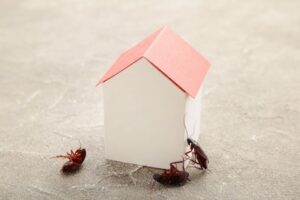Pest Control: Identifying and Preventing Common Household Pests
When it comes to maintaining a healthy and comfortable home, residential pest control is a vital yet often overlooked component. Pests can bring significant health risks and damage to your property if not promptly identified and managed. This comprehensive guide will shine a light on identifying and preventing common household pests, saving you stress, health problems, and costly repairs. Continue reading to arm yourself with knowledge and create a home environment free from unwanted guests. Whether you’re facing ants in the kitchen, spiders in the basement, or mice in the attic, this article has you covered with valuable information to maintain a pest-free environment.

The Importance of Pest Control
The importance of pest control extends beyond simple discomfort; it’s crucial for our health and home integrity. Pests can carry diseases, cause allergies, and damage property, posing serious threats to our well-being. Key reasons for pest control include:
- Disease Prevention: Many pests are carriers of harmful diseases.
- Allergy Reduction: Pests can trigger allergic reactions or asthma.
- Property Protection: Some pests, like termites, cause significant property damage.
- Food Safety: Pests compromise food hygiene standards.
Identifying and Preventing Common Household Pests
Being equipped with knowledge on how to identify and prevent common household pests is crucial to maintaining a healthy, safe, and comfortable living space. Each pest has its unique characteristics, and prevention strategies can significantly vary.
Rodents: Mice and Rats
Rodents are notorious for sneaking into homes, causing damage, and spreading diseases. They are often active during the night, making it challenging to spot them. Look for gnaw marks, droppings, and nesting materials. To prevent them, seal gaps in walls, store food in airtight containers and maintain cleanliness.
Insects: Ants
Ants can quickly invade your kitchen in search of food. Identifying their entry points is crucial. Clean up spills promptly, fix leaks, and use natural repellents like cinnamon or vinegar. Keep your pantry organized, and create barriers using substances like diatomaceous earth.
Insects: Cockroaches
Cockroaches thrive in warm and humid environments, making kitchens and bathrooms their favorite spots. Check for egg cases, droppings, and a musty odor. Eliminate clutter, fix leaks, and use baits or boric acid to tackle infestations.
Insects: Spiders
Spiders often find their way indoors through cracks and gaps. They help control other pests but can still be unsettling. Regular vacuuming, reducing clutter, and sealing entry points can minimize their presence. Use natural repellents or sticky traps as needed.
Insects: Termites
Termites can silently destroy your home’s wooden structures. Look for discarded wings, mud tubes, and hollow-sounding wood. Regular inspections by professionals are essential. Keep wood away from the soil, fix leaks, and maintain proper ventilation.
Insects: Bedbugs
Bedbugs cause sleepless nights with their itchy bites. Check for bloodstains on sheets, tiny eggs, and rusty spots on mattresses. Bedbug infestations require thorough and targeted treatment. Start by washing bedding, linens, and clothing in hot water to eliminate any bedbugs and their eggs. Vacuum your mattress, furniture, and carpets thoroughly, and discard the vacuum bag in a sealed plastic bag. For severe infestations, professional extermination is the most effective approach.
Birds and Bats
While birds and bats might seem harmless, they can create messes and spread diseases through their droppings. Seal entry points, install deterrents like netting or spikes, and keep outdoor spaces clean.
Understanding these pests, their signs, and prevention measures can go a long way in safeguarding your home from unwanted invasions. Knowledge is the first step to prevention.
General Prevention and Control Tips
Maintaining a pest-free home demands diligence and an understanding of prevention and control measures. Here are some general tips that apply to a broad range of household pests:
- Regular Cleaning: Regularly clean your home, eliminating food crumbs, spills, and clutter.
- Seal Entry Points: Close gaps, cracks, and openings where pests can enter.
- Proper Food Storage: Store food in airtight containers, and dispose of trash regularly.
- Home Maintenance: Fix leaks, repair screens, and maintain the integrity of your home’s structure.
- Landscaping: Trim bushes and trees away from your home to prevent pests from using them as bridges.
- Professional Inspection: Schedule regular pest inspections to catch problems early.
- Water Control: Fix leaky pipes and faucets and ensure proper drainage to avoid creating a favorable environment for pests.
- Trash Management: Regularly dispose of garbage and maintain clean bins to avoid drawing in pests.
Through these steps, you can proactively defend your home against a wide array of common household pests.

Frequently Asked Questions (FAQs)
Q: How do I know if I have a pest infestation?
A: Pest infestations often leave behind telltale signs. Look for droppings, gnaw marks on furniture or walls, strange odors, and unexplained scratching or squeaking noises. If you notice any of these signs, it’s advisable to investigate further or consult a pest control professional.
Q: Can I tackle pest control on my own?
A: For minor infestations, DIY methods can be effective. You can start by maintaining cleanliness, sealing entry points, and using natural repellents. However, if the infestation is extensive or persistent, it’s recommended to seek professional help. Pest control experts have the knowledge, tools, and experience to handle various pests safely and effectively.
Q: Are natural repellents effective?
A: Yes, natural repellents can be effective in deterring pests to some extent. Substances like essential oils, vinegar, and diatomaceous earth can help repel insects and rodents. However, the effectiveness may vary depending on the type of pest and the severity of the infestation. It’s important to use these repellents consistently and as part of a comprehensive pest control strategy.
Q: What’s the best way to prevent ants?
A: Ants are often attracted to food sources. To prevent them, keep your kitchen clean and free of crumbs, spills, and standing water. Seal entry points such as gaps around windows, doors, and utility lines. Additionally, using natural ant repellents like cinnamon or citrus peels can help deter ants from entering your home.
Q: How often should I schedule pest inspections?
A: Regular pest inspections are essential for early detection and prevention. It’s recommended to schedule a professional pest inspection at least once a year. However, depending on your location and the specific pests that are common in your area, you might consider more frequent inspections, especially before the seasons when pests are more active.
Q: How do I safely get rid of bedbugs?
A: Bedbug infestations require thorough and targeted treatment. Start by washing bedding, linens, and clothing in hot water to eliminate any bedbugs and their eggs. Vacuum your mattress, furniture, and carpets thoroughly, and discard the vacuum bag in a sealed plastic bag. For severe infestations, professional extermination is the most effective approach.
Q: What can I do to prevent future pest problems?
A: Prevention is key to long-term pest control. Regularly clean your home, especially areas prone to crumbs and spills. Seal entry points with caulk or weather stripping, and maintain proper ventilation to reduce moisture, which attracts pests. Keeping your outdoor spaces well-maintained and clutter-free can also discourage pests from taking up residence.
Conclusion
In conclusion, effective residential pest control starts with identifying and preventing common household pests. By understanding their behavior and implementing preventive measures, you can safeguard our homes and businesses. Regular inspections, proper sanitation, and proactive pest management strategies are crucial for long-term success. By prioritizing pest control, you can maintain a safe and healthy environment for everyone. Let’s stay proactive and keep pests at bay, ensuring peace of mind and protection for our spaces.
